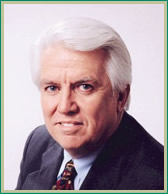
Being Left-Handed in a Right-Handed World
|
 |
|
| Dr. Paul D. Houston Founding Partner |
When Steve Sokolow informed me that this issue of the Lens was to deal with “Fighting for What’s Right,” I chuckled to myself. I have lived as a right-brained, left-handed human in a left-brained, right-handed world my whole life. Consequently, I’ve always been a bit out of step with others.
When you are left-handed, you’re constantly fighting a battle with the simplest things. Sit at the wrong place at a table and you’re banging elbows with your neighbor. Try to screw in something and your natural tendency is to do it backwards. Try to use scissors and the blades are wrong and you’re cutting with the dull one.
Here’s the lesson I’ve learned from being a lefty in a righty world: You always have to be more aware than others. What others take for granted, you have to think about. “Okay, I need to screw in this bulb. Now which way is the right way to do it?” You can’t rely on what comes naturally. “Okay, the group is getting ready to sit down for dinner. How can I casually ease into the left corner without making a spectacle of myself?”
When I was a child in school, most of the desks were designed for right-handers. I had to twist around to get to the paper. And when I was very young I used to drag my hand across the writing I had just completed—smearing it and making the outside of my hand a constant shade of dark pencil gray. That’s why so many lefties seem to write upside down. They learned to write that way as children so they wouldn’t smear things. Well, I have to admit I’ve spent most of my life trying not to smear things or trying to clarify the things I have “smeared” up—whether it was in the workplace or in my personal life. I have often awkwardly dragged myself across something in contrary ways to what I should be doing.
This perspective can be quite useful, however, in trying to answer the question of “what is right?” because the first step in fighting for what is right is trying to figure out what is right in the first place. Our lives are surrounded by those who think they know exactly what is right. Whether the topic is religion, politics, or economics, there’s no shortage of folks who think they know what is right and are willing to die (or kill) to see it happen. There’s really little difference between religious fanatics and political ideologues on this issue. Each category of true believers believes they know best and have been given some absolute right to impose their beliefs on others. It has been my experience that they shout their “rightness” at full volume when often they are wrong and should pipe down. What is badly needed is a bit more humility—the kind that comes from spending your life smearing up things because you don’t quite fit in. Our lives could profit from a few more people—okay, a whole lot more people—stopping to see if what they are proposing really fixes things rather than screwing up things or taking them in the wrong direction.
But once you get a sense of something that is really worth fighting for (and I’ve observed that those experiences are few and far between), you have to be willing to go all out. Yes, there are hills worth dying for, but try not to be the person who dies on every hill. I faced this situation during my tenure as executive director of the American Association of School Administrators (AASA) and the No Child Left Behind legislation was being proposed. At AASA, our internal process for deciding our legislative positions (which was led by our members) indicated that we should oppose the bill. My own instincts, honed by over 30 years in education (at that point), told me that while some of the bill may have been well-intentioned and some aspects were worth doing, on the whole any program that dictates a coercive and mechanical fix to a process (education) that must by its nature be intrinsic and organic was destined to do much more damage than good. I fought the bill personally and paid a number of prices to do so. I lost friends and some patrons, had my job threatened, lost out on a plum job possibility, and got knocked off the invitation list to many of the political events in D.C.—to name only a few. But I have never once regretted that I fought for what I thought was right. To this day I can look myself in the mirror and know I did the right thing.
There is a happy ending here. After all those years of fighting right-handed scissors, I finally got a pair of left-handed ones. The new scissors have allowed me to cut paper better, and my finely honed sense of “otherness” sharpened by years of being the one out of step with others has allowed me to cut through the BS in a world made up of too many people who feel entitled to the wrong opinion simply because they have been living in a world that will not challenge their assumptions. And I’m glad President Obama (and President Bill Clinton before him) is left-handed—and not because I believe that only left-handed people are in their right minds, as I saw once on a bumper sticker, but because I know they have had to accommodate themselves to something different from what seems natural. That’s a good starting point for any leader.
View Paul Houston's Political Blog
![]()
Center for Empowered Leadership ®
Email: info@cfel.org
Phone: 1.609.259.7911
